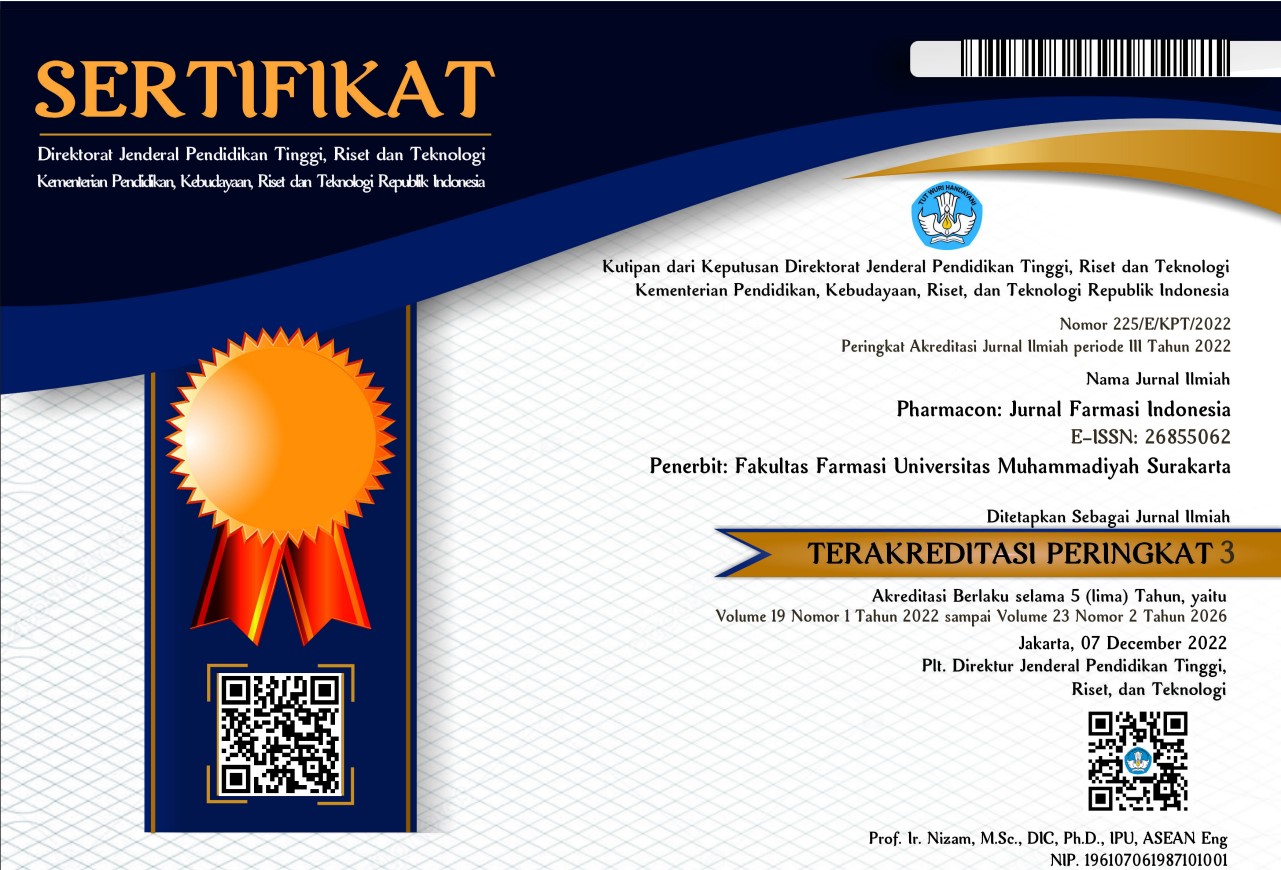Cost Consequence Analysis of Antidiabetic Therapy in Covid-19 Hospitalized Patients with Diabetes Mellitus at Panembahan Senopati Hospital Yogyakarta
DOI:
https://doi.org/10.23917/pharmacon.v21i1.4509Keywords:
antidiabetic drugs, covid-19, cost consequences analysis, hospitalizationAbstract
One of the significant respiratory infections is Covid-19, and its occurrence in Indonesia varies due to the diverse geographical positions across the region. Therefore, demographic groups consisting of individuals of a certain age and those with certain medical conditions remain at the highest risk of contracting Covid-19. The severity of Covid-19 patients are greatly influenced by underlying health conditions such as diabetes mellitus, hypertension, age, and obesity. In particular, diabetes mellitus is associated with an increased risk of severe illness and mortality among Covid-19 patients, potentially impacting healthcare expenditure, especially pharmaceutical costs. Therefore, this study aims to describe the financing of medication therapy, the outcomes of antidiabetic therapy, and the average direct medication costs inpatients with Covid-19 at Panembahan Senopati Hospital. Using a non-experimental descriptive-analytic approach, this study retrospectively collected data from medical records from 2020 to 2021. The results showed: 1) a description of diabetes mellitus treatment therapy with Covid- 19, namely the most common single therapy is the use of insulin, namely Novorapid and Novomix, a combination therapy of 2 drugs, namely Metformin + Novorapid, while a combination therapy of 3 drugs, namely Metformin + Novorapid + Glibenclamide 2) the achievement of therapeutic outcomes in diabetic patients with Covid-19 who received therapy as many as 77.27% of patients reached the target and 22.73% of patients had not reached the target glucose level 3) the average direct treatment cost of hospitalized diabetes mellitus patients with Covid-19 was IDR. 5,234,858 per patient based on the hospital's perspective.
Downloads
References
Al-kuraishy, H. M., Al-Gareeb, A. I., Alblihed, M., Guerreiro, S. G., Cruz-Martins, N., & Batiha, G. E. S. (2021). COVID-19 in Relation to Hyperglycemia and Diabetes Mellitus. In Frontiers in Cardiovascular Medicine (Vol. 8). Frontiers Media SA. https://doi.org/10.3389/fcvm.2021.644095
Andriani Fatimah, F., Febri Nilansari, A., Hi Wahid, R. A., Ulama Yogyakarta Anis Febri Nilansari Fakultas Sains dan Teknologi, N., Hi Wahid Fakultas Sains dan Teknologi, R. A., & Kunci, K. (n.d.). Analisis Efektivitas Biaya Terapi Antihipertensi pada Pasien Rawat Inap Covid-19 dengan Hipertensi di RSUD Panembahan Senopati Bantul Yogyakarta.
Anggiswari Pradnya Angela, K., & Made Juliana, I. (2022). DM Tipe II Terinfeksi COVID-19 dengan Hiperglikemia yang Sulit Terkendali Pasca Hipoglikemia Open Access ABSTRAK. In UMI Medical Journal (Vol. 7, Issue 1).
Balqis, A. Y., Ramdhani, H., & Amelia, E. K. (2021). Perkembangan Terapi Diabetes Mellitus Tipe 2 Pada Pasien Yang Terinfeksi Covid-19. Journal of Experimental and Clinical Pharmacy (JECP), 1(2). https://doi.org/10.52365/jecp.v1i2.244
Baroroh, F., Yuliana Solikah, W., & Urfiyya, A. (2016). Analisis Biaya Terapi Diabetes Melitus Tipe 2 Di Rumah Sakit Pku Muhammadiyah Bantul Yogyakarta Cost Analysis Of Type 2 Diabetes Mellitus In Pku Muhammadiyah Bantul Yogyakarta Hospital. In Jurnal Farmasi Sains dan Praktis: Vol. I (Issue 2).
Cahyaningrum, N., (2023). The Relationship between 3h Diet Patterns (Amount, Type, Schedule) and Sedentary Behavior with Blood Sugar Control in Type 2 DM Patients (Case Study at Mulyoharjo Community Health Center). Nutrizione, 3, 12-22. https://journal.unnes.ac.id/sju/index.php/nutrizione/
Cahyaningsih, A. L., & Amal, S. (2019). Evaluasi Terapi Insulin pada Penderita Diabetes Mellitus Gestasional di RSUP dr. Soeradji Tirtonegoro Klaten Periode Oktober 2014-Oktober 2017. In Pharmacy Department of Unida Gontor 1 Pharmasipha (Vol. 3, Issue 2).
Dinas Kesehatan Pemerintah DIY 2021, Profil Kesehatan 2021 DIYogyakarta, Indonesia
Endokrinologi Indonesia, Pedoman Pengelolaan Dan Pencegahan Diabetes Melitus Tipe, P. (N.D.). Pedoman Pengelolaan Dan Pencegahan Diabetes Melitus Tipe 2 Dewasa Di Indonesia,2021, PERKENI, Penerbit PB. PERKENI.
Fransiska, M., & Sriwandi, N. (2016). Faktor-Faktor Yang Berhubungan Dengan Kejadian Diabetes Mellitus Tipe Ii Pada Lansia Di Wilayah Kerja Puskesmas Mandiangin Kota Bukittinggi Tahun 2015. In Jurnal Kesehatan STIKes Prima Nusantara Bukittinggi (Vol. 7, Issue 2).
Hemmingsen, B., Christensen, L. L., Wetterslev, J., Vaag, A., Gluud, C., Lund, S. S., & Almdal, T. (2012). Comparison of metformin and insulin versus insulin alone for type 2 diabetes: Systematic review of randomised clinical trials with meta-analyses and trial sequential analyses. In BMJ (Online) (Vol. 344, Issue 7853). https://doi.org/10.1136/bmj.e1771
IDF Diabetes Atlas 10th edition. (n.d.). www.diabetesatlas.org
Lorenzoni, V., Baccetti, F., Genovese, S., Torre, E., & Turchetti, G. (2017). Cost-consequence analysis of sitagliptin versus sulfonylureas as add-on therapy for the treatment of diabetic patients in Italy. ClinicoEconomics and Outcomes Research, 9, 699–710. https://doi.org/10.2147/CEOR.S141477
Madelina, W., Untari, E. K., & Nansy, E. (2018). Efek Perseptif Penggunaan Kombinasi Antidiabetes Oral-Insulin pada Pasien Diabetes Melitus Tipe 2 di Kota Pontianak dan Sekitarnya. Indonesian Journal of Clinical Pharmacy, 7(3), 209. https://doi.org/10.15416/ijcp.2018.7.3.209
Nasution, F., Azwar Siregar, A., & Tinggi Kesehatan Indah Medan, S. (2021). FAKTOR RISIKO KEJADIAN DIABETES MELLITUS (Risk Factors for The Event of Diabetes Mellitus). Jurnal Ilmu Kesehatan, 9(2).
Panua, A. A., Zainuddin, R., Ahmad, E. H., & Sangkala, F. (2021). Faktor Risiko Terjadinya Covid-19 Pada Penderita Diabetes Melitus Tipe 2. Jurnal Ilmiah Kesehatan Sandi Husada, 10(2), 624–634. https://doi.org/10.35816/jiskh.v10i2.668
PERKENI, 2015, Consensus on the management of type 2 diabetes mellitus in Indonesia 2015. Semarang: PB PERKENI
Prasetyani, D. (2017). Analisis Faktor Yang Mempengaruhi Kejadian Diabetes Melitus (DM) Tipe 2 Analysis Of Factor Affecting Type 2 Diabetes Melitus Incidence. In Jurnal Kesehatan Al Irsyad (JKA) (Issue 2).
Riset Kesehatan Dasar (Riskesdas) (2018). Badan Penelitian dan Pengembangan Kementerian Kesehatan RI pada tahun 2018.
Teixeira-Lemos, E., Nunes, S., Teixeira, F., & Reis, F. (2011). Regular physical exercise training assists in preventing type 2 diabetes development: Focus on its antioxidant and anti-inflammatory properties. In Cardiovascular Diabetology (Vol. 10). https://doi.org/10.1186/1475-2840-10-12










